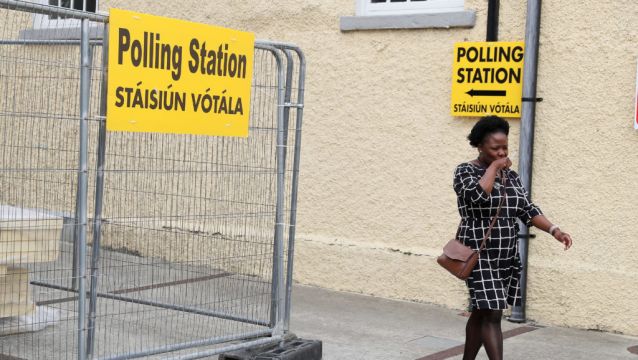Artificial intelligence (AI) and deepfakes will be a factor in the upcoming elections in Ireland, according to a senior computer science lecturer.
A recent motion tabled by Fianna Fáil Senator Malcolm Byrne called for the Electoral Commission to create a strategy to tackle the misuse of artificial intelligence in political campaigning.
Dr Dympna O'Sullivan, senior lecturer in computer science and academic lead of the Digital Futures Research Hub at Technological University Dublin, feels the threat is very real, as Ireland heads into a busy period of elections.
There will be local and European elections in 2024, and while the Government has to call a general election by March 2025, there is consistent speculation that the Coalition may call one next year.
Dr O'Sullivan told BreakingNews.ie: "Whether it's images, voice synthesis... they can be really easily produced now, even by anybody without AI expertise. I think it's something we'll have to be very vigilant of in elections."
The EU AI Act aims to bring some regulation to the area. However, Dr O'Sullivan pointed out that it will probably not come into force until around 2025 as it has hit stumbling blocks over generative AI.
"I think the bigger problem is that we haven't really established rules and norms for the digital space in general. Where that has come to the fore is social media and we're seeing what I would call disasters of social media.
"Self regulation does not work, we know that. We've seen the issues around social media tools around toxic content, spreading misinformation without any regulation, they've become really key tools in the culture wars."
She added: "There are some things that the EU AI Act will bring in that will be applicable for this context, for example things like if you generate something using AI, there must be some sort of watermark. Of course, for that, it has to be someone following the rules, not a bad actor, but I think there are other things we need to be looking at.
"Along with regulation, we have to work with the tech companies on this. What are the advanced detection technologies that can be used to debunk and understand these deepfakes? Fact-checking processes are really important too."
Dr O'Sullivan also feels information and education campaigns for the public on AI are vital.
"One of the things I talk about a lot is poor levels of AI literacy in the general public," she said. "Most people have a poor understanding of AI, how it works, and what the general implications are, so that sort of education and awareness about the potential of deepfakes are all part of this broader picture.
"We have to bring lots of people together on the journey: tech companies, policy-makers, regulators, politicians and the public."

Dr O'Sullivan often works in citizen think-ins around AI, and she said: "The two most common things are Netflix recommendations and killer robots. There are so many AI applications in the middle there.
"Not just with toxic content and misinformation, but people are really unaware of how many decisions are being made about them now by algorithms. What happens to information when they upload it to social media, how your data is aggregated, how often you're caught by surveillance systems. With a lot of the stuff there is no harmful impact.
"I think just generally educating people and allowing them to understand these things... and why legislation is important.
"Think about something like GDPR or data protection. If you're unhappy with how someone has handled your data, you can complain to the Data protection commissioner, but we don't have anything like that for AI or social media.
"Most citizens don't know what to complain about, or how to articulate a problem or breach, and that is because AI literacy is really poor."
She said a big problem is that legislation and acts on AI are "being rolled out really slowly" due to the complexity of the issue, while "the tech is the exact opposite, speeding ahead. This time last year, we wouldn't even be talking about ChatGPT, now it's not even the leading generative AI tool".
Dr O'Sullivan said images that can be made with generative AI are "frighteningly good".
She said the Electoral Commission, which will look at AI along with the oversight of elections, should work with media and individuals to establish norms for fact-checking.
While it may be impossible to prevent bad actors using AI in an attempt to interfere with elections, Dr O'Sullivan said the Electoral Commission should focus on a public information campaign.
"Manipulated content: What is it? How can it be used? What will the different types be? They could be video, audio, identity theft. Just a general campaign on what misinformation online looks like... that's good practice in general to educate your citizens on that, not just in an election scenario, but it's very important for that."
Many social media companies have offices in Dublin including the likes of Meta (Facebook, Instagram, WhatsApp), X, formerly Twitter, and TikTok.
Dr O'Sullivan said the Government and the Electoral Commission should try to take advantage of this proximity to leading tech companies.

"One big problem is that a lot of the tech expertise lies solely within these companies, not within organisations like the Electoral Commission," she explained. "There needs to be a joining up of people who really understand elections and the people who understand the technology and how it can be used."
One example that has been given of how AI could significantly impact an Irish election would be a fake video of Tánaiste and Fianna Fáil leader Micheál Martin indicating he would be open to a coalition with Sinn Féin.
Dr O'Sullivan said the current generative AI would make it possible to make such misleading content relatively easily.
"They can be pretty realistic... video and audio. Simpler things like text that portrays political figures making statements, or engaging in actions can be convincing too.
"It could easily be done in a way that's engaging enough and manipulating enough. That's where the social media aspect comes in... it's about profiling the users it could be more influential on, and that's something which I think is really important for the Electoral Commission, getting in there."
She added: "It would have been the same for gardaí around the riots, actually having access to social media networks and understanding those users who are more manipulable.
"The people creating are doing that, they're profiling people, so we should be doing that on the other side of the fence."
Year of elections
Next year will see the local and European elections in Ireland, a possible general election, a likely UK general election, and the US presidential election.
Dr O'Sullivan said this heightens the risk of the use of AI to interfere in them.
"The confluence of different elections. Even look at the Dublin riots, there was a lot of commentary from far-right groups in the UK and the US on it. It's a global phenomenon. Particularly around Facebook, we've seen how that was used to manipulate and interfere in elections across the globe. People will be using elections across the globe to perfect these techniques. I think it could be a pretty bleak couple of years before we have the regulation in place and these pretty high-profile elections going on.
"The US election will be a huge target; it's so polarised, the culture wars are so ingrained there. I think what we see there could be really nasty."
Pointing to how easy it can be for generative AI to go viral, Dr O'Sullivan referenced the famous image of Pope Francis wearing a puffer jacket.
"That has probably been the most effective deepfake so far. It wasn't produced by any disinformation warrior, it was just a hobbyist who created it. It just shows how easy it is now, and how things go viral."

Dr O'Sullivan also fears that the talk around AI and deepfakes will lead to people becoming more sceptical about elections.
"People talk about how AI will change the world with all the existential stuff. I don't buy into it, but one of the things I think will really change the world is everyone having access to such powerful AI in their pockets.
"It democratises AI, which is a good thing in one way, giving these tools to people, but you will always have bad actors who use them for malign purposes.
"Since there has been more talk about regulation of AI, people are more fearful of AI, which they weren't a year ago, because they probably weren't thinking about it much.
"What you might see is, we'll have the elections, all the discourse around deepfakes, and what we'll probably end up with is people more sceptical of the electoral process because there'll be more of this talk around things being manipulated."
I think the Electoral Commission need to be thinking about what this process will look like now.
However, she added: "I think that's a journey we have to go through.
"We have to raise awareness about it, bring it to the fore and talk to people about it. But I think in the interim, while we're at this cusp between technology and elections, we are going to see a dip in public trust in elections, which is destabilising, there's no question about it.
"It's the only way we can protect trust in the institutions and the democratic process. There has to be education and awareness. I think we should be starting to think about... of course, voters are older, so targeted campaigns for them, but we should be teaching AI literacy in our primary schools.
"People need to be aware of the difference between real life and AI-generated life, but because of what's coming ahead of us, I think the Electoral Commission need to be thinking about what this process will look like now."







